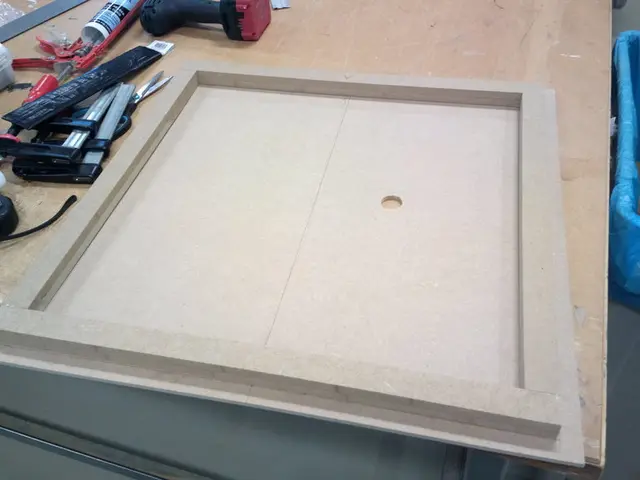Recycling Plastics Transformed into Bicycles: Anne Koudstaal's CityChanger Initiative
PlasticRoads, a groundbreaking innovation in road infrastructure, is made from recycled plastic, offering a multitude of benefits while addressing pressing environmental issues. This revolutionary concept, developed by Anne Koudstaal and Simon Jorritsma, is designed to combat plastic pollution and urban flooding.
Benefits of PlasticRoads
Reducing Plastic Pollution
By repurposing large quantities of plastic waste, PlasticRoads contribute to alleviating the global plastic waste crisis. Plastic waste, a persistent pollutant, accumulates in landfills, oceans, and soils, posing environmental and health risks. By diverting plastic from these harmful accumulation points, PlasticRoads help protect our planet [1].
Durability and Climate Resilience
Plastic-infused pavement is more resistant to common road damage such as cracks, potholes, and surface irregularities, which are often exacerbated by extreme heat and flooding. This enhances the lifespan of roads and reduces repair costs and road disruptions [1][5].
Sustainability and Environmental Impact
Roads constructed using recycled plastics reduce greenhouse gas emissions and energy consumption compared to traditional asphalt production. The reuse of plastics supports a circular economy, conserving natural resources and lowering environmental footprints [4].
Urban Flooding Mitigation
PlasticRoads often incorporate hollow structures or modular designs that allow water drainage through the road surface, reducing surface runoff and mitigating urban flooding problems effectively. Although this specific flooding mitigation benefit is established in PlasticRoad concepts generally, the Texas pilot project focuses on monitoring performance under flood conditions [1].
Cost and Maintenance Efficiency
Due to enhanced durability, plastic roads require less frequent maintenance and replacement, reducing overall infrastructure lifecycle costs and disruption to traffic [1][2].
Implementation Processes
Research and Development
Prototypes of plastic-infused roads undergo rigorous testing, including durability under local environmental stresses such as heat and flooding. Examples include pilot projects like the one in Rockwall, Texas, and infrastructure trials in Bangladesh and on university campuses [1].
Plastic Waste Collection and Preparation
Plastic waste, including common items like detergent bottles, is collected, cleaned, shredded, and processed into usable plastic elements suitable for road material incorporation [1][2].
Material Integration
Recycled plastic components are combined with other materials to create plastic-infused composites or used as asphalt modifiers. This can improve properties such as aging resistance and cracking resistance of the pavement [5].
Construction and Installation
Roads are constructed using these plastic-infused materials that may include hollow blocks or modular elements to facilitate water drainage. Installation techniques are adapted to ensure performance standards and to monitor key metrics over time [1][4].
Performance Monitoring
Long-term monitoring is essential to evaluate durability, environmental performance, and flood mitigation effectiveness. Data collected guides further improvements and supports wider-scale adoption [1].
Additional Context
The successful implementation of PlasticRoads requires collaboration across research institutions, government bodies, and industry stakeholders to support innovation, investment, and public acceptance [1][3]. Safety and environmental sustainability are prioritized, as plastic-road infrastructure like EcoPoste signposts demonstrate that recycled plastic materials can outperform traditional materials in durability, safety, and environmental impact [2].
PlasticRoads provide a durable, sustainable, and flood-resilient infrastructure solution that tackles plastic waste pollution and urban flooding challenges. Their implementation typically involves plastic waste recycling, material processing, composite fabrication, road construction, and ongoing performance assessment to ensure environmental and structural benefits are realized effectively [1][4][5].
Expansion of Sustainable Practices
The adoption of PlasticRoads in home-and-garden projects and lifestyle choices could potentially lower individual carbon footprints and contribute to a broader shift towards environmental conservation. By incorporating recycled plastic elements into everyday household items, consumers can embrace eco-friendly living while supporting the circular economy [1].
Technological Applications
The advancements in recycling technologies and PlasticRoad innovations could be further applied in other sectors, such as technology and environmental science. For instance, fine-tuning plastic waste collection and preparation methods could lead to more efficient production processes for electronic devices and renewable energy resources [5].
Public Awareness and Education
To ensure wide-scale implementation of PlasticRoads, public understanding and support are vital. Organizing educational workshops, seminars, and outreach programs can help people appreciate the benefits of recycled plastic roads and encourage their active participation in environmental conservation [3].




